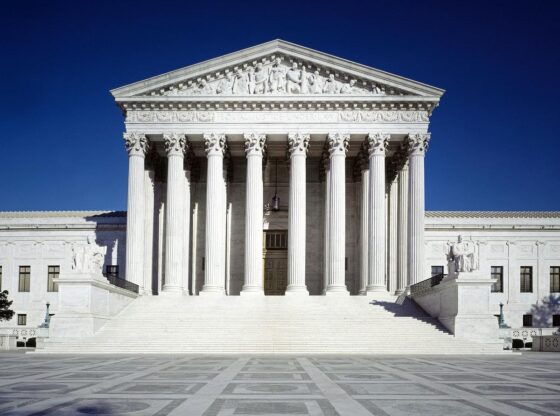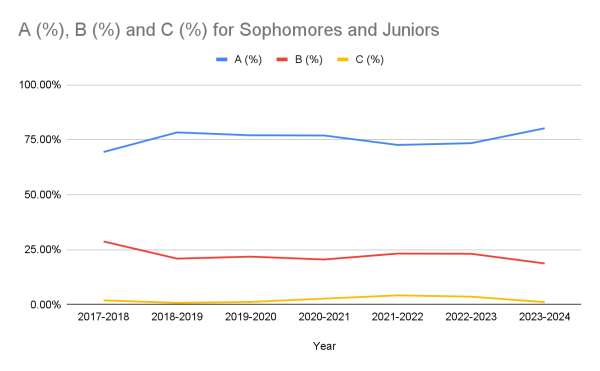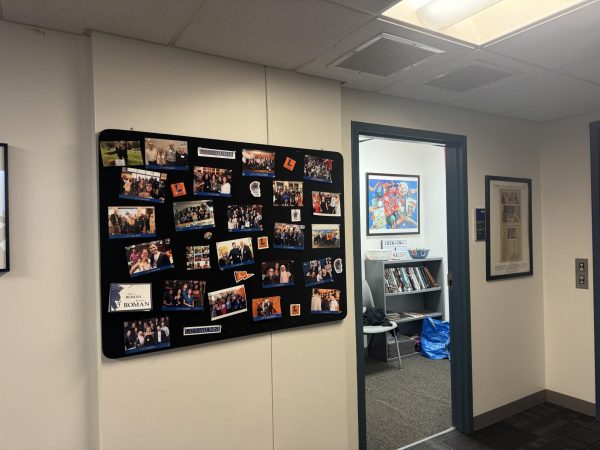Latin Students Cautiously Await Impact of Supreme Court Decision on Affirmative Action in College Admissions

Carol M. Highsmith
The U.S. Supreme Court reversed course in June, ruling against race-based affirmative action in college admissions.
With college admissions season ramping up, Latin seniors and college counselors are anxiously waiting to see how this summer’s controversial U.S. Supreme Court ruling on affirmative action may impact their college admissions process.
“Our job is unpacking this and making sure that students understand it and understand what [the ruling] means,” Director of College Counseling Alexandra Fields said. “But also, we can’t lie and say it’s all going to be okay. We don’t know what this is going to look like.”
On June 29, the U.S. Supreme Court found the race-conscious admissions processes of Harvard University and the University of North Carolina unconstitutional in the landmark cases of Students for Fair Admissions v. President and Fellows of Harvard College and Students for Fair Admissions v. University of North Carolina. In each case, plaintiffs argued that race considerations in college admissions discriminate against Asian American applicants and, in the latter case, white applicants.
Affirmative action was developed during the Civil Rights Movement of the 1960s, which, in the context of school admissions, allowed for an applicant’s background, including race, to be factored into admissions decisions. This consideration helped to ensure that marginalized groups, including women, were afforded equal opportunities in education. The first case that weighed the constitutionality of such policies was Regents of the University of California v. Bakke (1978), where the Supreme Court allowed race, but not racial quotas, to factor into admissions. That ruling was bolstered by Grutter v. Bollinger, which also recognized the educational benefits of diversity. The Supreme Court again upheld “narrowly tailored” affirmative action in college admissions in 2013 in Fisher v. University of Texas at Austin.
The 2023 cases, however, ruled that race could be considered only to the extent that an applicant’s race is “concretely tied” to a “quality of character or unique ability” that the applicant would bring to a school. Race, as a standalone factor, can no longer be legally considered.
Highlighting a common misconception about affirmative action, Ms. Fields said, “What people don’t understand about this is this myth that what race-conscious admission did was that it allowed a less qualified student of color to take the spot of a more qualified white student. And that is simply not what was happening.”
This misconception appears to underlie much of the controversy surrounding affirmative action policies in college admissions.
“If you can just imagine the number of candidates [selective colleges] get who have high SAT/ACT scores, four-point-something GPAs, [and] tons of extracurriculars,” Upper School English teacher and Diversity, Equity, and Inclusion Curriculum Coordinator Brandon Woods said. “The anxiety parents and students have is because there are so many people that have those qualifications [and] people are looking for a reason that they didn’t get accepted.”
Although some who are disappointed with their college results may blame affirmative action, some Latin students are disappointed that race is no longer a legally permissible consideration.
“Affirmative action means making space for people who were not previously allowed in a space, [and] diversifying spaces that have not been previously diversified,” senior Payton Rice said.
Senior Carmen Quinoñes agreed. “I think that [affirmative action] was taken out of context. People thought it meant that if you were a minority or historically marginalized person that it’d give you a leg up, and you wouldn’t have to be at the same standard as another candidate.”
However, Latin students seem to recognize how one’s race can overlap with identity and shape life experiences. “If you have an idea of who [the applicant is], where they come from, and what their culture may be like, taking that out just erases who the person is,” senior Nadia Rivera said.
While the primary impact of this summer’s ruling means that colleges and universities will no longer be permitted to consider race, the struggles of an individual may still be evaluated in other areas of college applications. “While you can explain [race] in your supplemental essays and explain your family’s situation as well as what you’ve been through, [the court’s ruling] removes that extra thing that’s like, ‘Realize this about me as a person,’” Payton said.
Mr. Woods said, “The ruling in some ways is contradictory. On one hand, it is really about the checkbox that lists racial and ethnic identities. But there was also part of the ruling that says colleges can still look at parts of the student identity in their applications.”
The decision will impact incoming college students as it inevitably makes it more challenging for colleges and universities to create diverse classes. “I think colleges are trying hard to figure out how they can still build a diverse class based on other materials,” Mr. Woods added.
Indeed, colleges have a reason to worry. In 1996, California voters approved Proposition 209, a ban on race-based affirmative action in public universities in the state. “And so they removed the box asking you to identify [race] from their application,” Ms. Fields said. “In a single year, Black Indigenous People of Color enrollment in the UC system dropped 12% and BIPOC enrollment at the two most selective of the UC schools, UCLA and Berkeley, dropped by 60%.”
Additionally, students are grappling with how to best represent themselves on applications. “There’s definitely been angst,” Ms. Fields said. “And then a lot of concern about ‘what can or can I not say in my application?’ and then a lot of concern about ‘could this hurt me in the admissions process?’”
“It was kind of surreal when I was filling it out and there was no question about ‘what’s your identity, what’s your ethnic background, what’s your race?” Nadia said. “It makes the person applying like a number now. Like you’re number 42 out of 1,000.”
Minority or not, many students share concerns about what the ruling will mean for campus diversity as they navigate the new application process.
“We are really encouraging students to ask careful and thoughtful questions about the schools they are looking into, to see if being on a diverse campus is important to you, which most of our students—regardless of their race—would say is important to them,” Ms. Fields said.
That sentiment is apparent to many of the seniors. “I’d love to say we’re in a place where we don’t need affirmative action, but I can’t say that reliably,” Payton said. “The spaces in this country are not yet equitable [and] are not yet set up in a way that we could have confidently removed affirmative action.”
Similarly, Nadia said, “It hasn’t necessarily changed the way I think about the process, but rather how I view the system of college. Unfortunately, there are so many marginalized groups because we live in a society where, unless you’re a white, cisgender male, you’re going to have a harder time. For me, being all of these other boxes that are outside of the norm, I think it’s really important to have these protections in place.”
Payton agreed. “To a certain extent, I understand how [the Supreme Court’s] actions came from a place of trying to be equitable, but it still doesn’t provide resources for those who need them,” she said. “We know—just based on statistics—that there is a correlation between resources and race. Although there are exceptions to those rules, most of the time, it’s people of color who don’t have the resources to be able to have their stats look amazing.”
As for admissions policies for those applying to Latin, the school has no plans to alter its affirmative action practices. Shortly after the court ruled against affirmative action, Head of School Thomas Hagerman sent out a note to the Latin community that said, “I write to you today to reaffirm Latin’s dedication to enrolling and supporting a diverse student body, and to assure you that our commitment to diversity, equity, and inclusion does not shift with this ruling.”
In addition to race, Mr. Woods emphasized the importance of economic diversity in the student body. “There should be more focus on socioeconomic status,” Mr. Woods said. “And I still think, despite the work we’re doing, when people talk about DEI, they still think in terms of race, possibly gender, and sexuality, but one of the things we really want to bring to the forefront is economic status.”
Latin students appear to be equally committed to finding solutions. Although the Supreme Court overturned affirmative action, Latin students will continue to fight for what they believe in. “If we can vote properly, do our research, and do everything that we possibly can to make something better, then we should,” Nadia said. “We can see that even all the protests and boycotting going on now are making a difference. If we all keep trying to push forward, spread awareness, and call out all of the madness that’s going on, we could get somewhere.”

Mia Kotler ('25) is thrilled to be one of the Editors-in-Chief for The Forum this year. She is a passionate writer who enjoys expressing her views and...

Cherish Curtis ('26) could not be more excited for her third year on The Forum. Cherish looks forward to continuing to serve as a Sports Editor and relay...























































